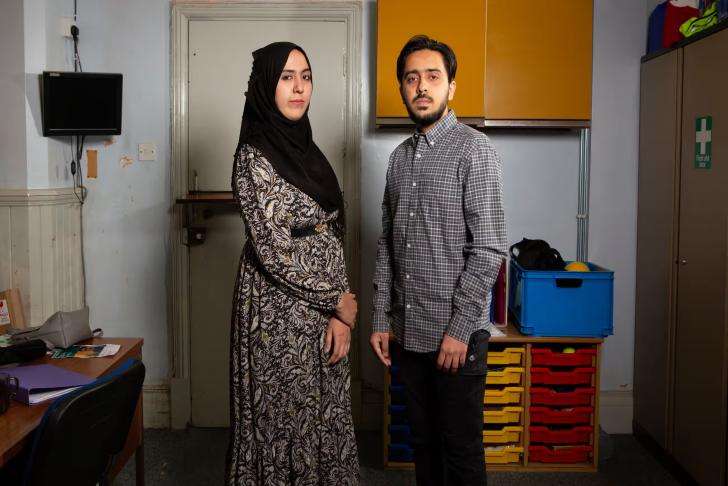Despite having done nothing wrong, thousands of migrant care workers have been threatened with deportation after the Home Office initiated enforcement action against their employers.
A brother and sister from India were told they had been duped and had to find another employer to sponsor them within 60 days or leave the country after paying a recruitment agency £18,000 to get care jobs in the UK.
To pay for their move to the UK, Zainab Contractor, 22, and her brother Ismail, 25, had taken out loans from family members. However, upon their arrival, they claim they were not assigned any shifts and that the accomodation they had been promised had not materialised.
In April, they found out that the company that had sponsored their visas had been stripped of its licence to recruit workers from abroad by the Home office. But the enforcement action would also punish them: the siblings were sent a letter saying that because their sponsorship was linked to the sanctioned company, it was no longer valid.
They have since applied to more than 300 employers between them in the hope of finding another company to sponsor them. But, as is common, they have been unable to find any willing to take them.
Zainab, who moved from Maharashtra in India to build a better life for her two-year-old son, said they now faced returning home with debts they had no prospect of being able to repay – unless they can find another sponsor by June. “We don’t know how we will survive,” she said.
Ismail, who quit his job as an investment analyst to come to the UK, said: “It’s not fair. We are being thrown out without being heard.”
Their case is not a one-off. An investigation by the Bureau of Investigative Journalism and the Observer has found that 3,081 care workers had their certificates of sponsorship cancelled by the Home Office in 2022 and 2023.
In 94% of cases, the reason for the cancellation was that the company that hired them had its right to sponsor workers revoked.
Another care worker threatened with deportation described the experience as “hell”. The 32-year-old woman, Katherine*, left her job as a teacher in Nigeria to become a care worker in the UK. She and her husband sold their land and car dealership business to cover relocation costs.
But she says she was not given the work she had been promised. “[The manager] was not taking my calls,” she said. “We were frustrated and confused.”
Kay Mayo, registered manager of S&K Care 24, admitted no care worker sponsored by the company had been given any work because it had not managed to secure care provision contracts with local authorities.
As a result, and because the company was acting as a recruitment agency, the Home Office revoked its sponsor licence. Katherine was sent a 60-day letter in March and now has until mid-May to find a new sponsor or lose her visa. “My experience in this country has been from one hell to another,” she said.
The findings have prompted calls for reform of the tied visa system for care workers and demonstrate how workers are suffering for their employers’ rule-breaking – first exploited or given false promises, and then threatened with deportation by the government.
Aké Achi, the founder and chief executive of Migrants at Work, which supports people on work visas, said the Home Office was penalising people who had “followed the rules”. “They’ve been punished twice,” he said.
The Home Office said it had taken action to “crack down on worker exploitation and abuse” within the care sector and was working hard to “support care workers into alternative jobs when their sponsor has had their licence removed”. But when asked about what this support was, it did not provide details – saying only that the work was “ongoing”.
Christina McAnea, Unison general secretary, said workers were being “left in the lurch”.
“Many migrants have sold everything, uprooted their lives and racked up huge debts, only to find they’re now at risk of deportation,” McAnea said.
“The government asked migrant care staff to come here. So it’s only right when things go wrong and staff lose their sponsoring employer, they get help to find new work and longer to secure support for a new visa.”
Balakrishnan Balagopal, a community activist and journalist who has launched a petition calling on the government to try to scrap the 60-day rule, said it was often not long enough to find another sponsor, or to arrange departure. He added that it was especially hard on families who had to find money for plane tickets at short notice, exit rental contracts abruptly and pull children out of school.
“Innocent people are finding themselves abandoned when a previously legitimate sponsor loses their licence,” he said.
Aside from losing its overseas sponsorship licence, there are often no further consequences for a sponsor that breaks the rules. The company can continue to operate as normal simply by hiring UK workers.
The government has also been accused of dramatic failings in the vetting process for companies granted sponsorship licences in the first place.
An Observer investigation revealed in March that hundreds of newly established care providers had been granted licences despite having no track record of providing services in Britain.
Suspected bogus companies with copy-and-paste websites, fake-looking reviews and PO boxes as addresses were among those granted licences allowing them to sponsor workers to come to the UK. Newly formed companies that have never filed accounts and are only a few months old have also been granted permission to hire from abroad – as well as at least 268 companies that had never been inspected by the Care Quality Commission.
Some care workers who faced losing their visa after licence revocations have been able to find a job within the small window given by the Home Office. With five days left before her deadline, Rachel*, 43, from Nigeria was able to secure a sponsorship with the help of a friend from church.
She said the process not only affected her but also her three children who came to the UK, alongside her husband, as her dependents. “Each time they come back from school, they will ask me if we’ve seen another sponsor. So it was really stressful for them,” she said.
She said others in her company have not been so lucky. “It’s terrible – some of them cry,” she said. “You see a grown woman crying like a child … you wouldn’t even know the words you would tell her to console her.”

_7.jpg)

_8.jpg)




.svg)


